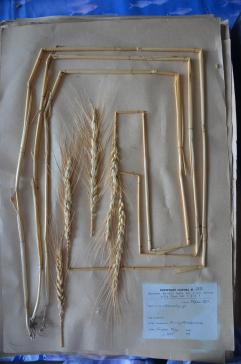Climate change and the late twentieth-century globalization of the food supply have provoked renewed concern about the ability or inability of local, regional, and national communities to feed themselves. Human beings survive on a handful of cereal crops. Maize, rice, and wheat make up roughly half of the world’s caloric intake. Yet historians have paid little attention to the research and development of their seeds, which are not products of nature but Neolithic technologies, domesticated some 10,000–12,000 years ago and improved by successive generations of farmers.
At the MPIWG Courtney Fullilove pursued two projects on the historical investigation, organization, development of global plant genetic resources, using select major wheat varieties as a focal point. The first, drawn from her book-inprogress on the nineteenth-century US agricultural development, analyzed displaced people as agricultural innovators through a study of hard red winter wheat brought from Ukraine to Kansas by German Mennonite immigrants in the 1870s. The second examined the broader technological, legal, and administrative apparatuses governing global plant genetic resources, including bioinformatics, intellectual property rights, and international genebank management. Together these historical investigations aimed to provide an alternative narrative of biological innovation and identify the possibilities and limits of concepts in agrobiodiversity, food security, and rural development.
This project originated in doctoral research on the collecting practices of the US Patent Office’s Agricultural Division, which spearheaded government supported agricultural improvement prior to the formation of the US Department of Agriculture in 1862. It has since benefited from collaboration with genetic resource specialists and bioarchaeologists in Syria, Russia, and the UK, especially the Genetic Resource Unit of the International Center for Agricultural Research in the Dry Areas (ICARDA) in Aleppo, Syria and the N.I. Vavilov Research Institute of Plant Industry (VIR) in St. Petersburg, Russia. It builds on two summers of field research with genetic resource specialists in Armenia, Georgia, and Tajikistan collecting traditional varieties and wild relatives of cereals.

